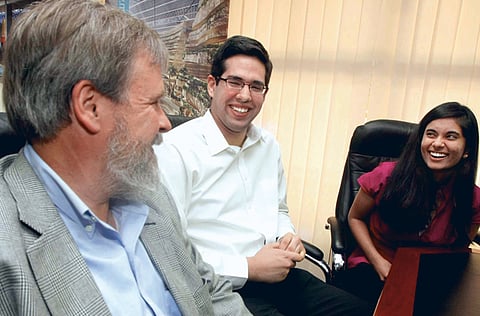Abu Dhabi's ecological work gets MIT team thinking
Students from university's Terrascope programme visit Masdar as part of a project on controlling atmospheric carbon dioxide levels

Abu Dhabi: A delegation of 40 students from one of America's top universities — The Massachusetts Institute of Technology (MIT) are in Abu Dhabi on an educational and research trip. The main purpose of the students' visit is to study Abu Dhabi's approach to a "green" environment and the campaign for clean air launched at Masdar city.
The Terrascope programme at MIT is a scientific learning community through which students work to find solutions to larger problems. Each year, the programme sticks to a theme for the class' research.
The theme for the current batch is centred on how to control the steady increase of carbon dioxide, in the earth's atmosphere, which is recognised as a major contributor to global warming.
Impressed by Masdar's vision
"This is something measurable as we already know its dramatic impact on the environment," said Alexander Keesling, one of the visiting students.
"The people at Masdar are taking a global stance and thinking about the future of the world as a whole. It's an inviting vision for other nations to follow and sets a righteous example," added Keesling.
In 2006, the UAE took a historic decision to embrace a "green" environment and to develop and implement plans for clean and renewable energy. Masdar city is a culmination of this charter, defined as the "world's first clean-technology cluster in a zero-carbon, zero-waste, renewable-energy-powered city." It is also an economic zone that seeks to be a global centre for innovation, research and product development.
Unique experiment
"Masdar's objective and approach is impressive," said Ranjeetha Bharath, another visiting student.
"We spent one whole semester looking for ways to encourage others to take steps to minimise carbon emissions, and are here in Abu Dhabi to see the world's first carbon-neutral city [under construction]," she added.
"I chose to come because the experiment in Masdar is unique. It's also rather impressive that rather than investing in traditional sectors such as real estate or oil, UAE leaders are thinking centuries ahead and generations from now," said Prof Samuel Bowring, one of the four visiting MIT professors.
"This hasn't been done before; this kind of investment by Abu Dhabi is a very valuable one, making the community a carbon-negative city," said Bharath.
Real-life learning
MIT's Terrascope programme aims to integrate traditional classroom lectures with real-life experimental learning an approach the UAE has also adopted as an educational objective to create a new generation of students better prepared to contribute to the UAE's continuous progress and development.
Sign up for the Daily Briefing
Get the latest news and updates straight to your inbox
![Sharjah to pilot UNESCO’s ECCE-PATT tool, highlighting its leadership in early learning systems. [Illustrative image]](http://media.assettype.com/gulfnews%2F2026-02-08%2F3mxn16n8%2Fchild.jpg?w=320&auto=format%2Ccompress&fit=max)

